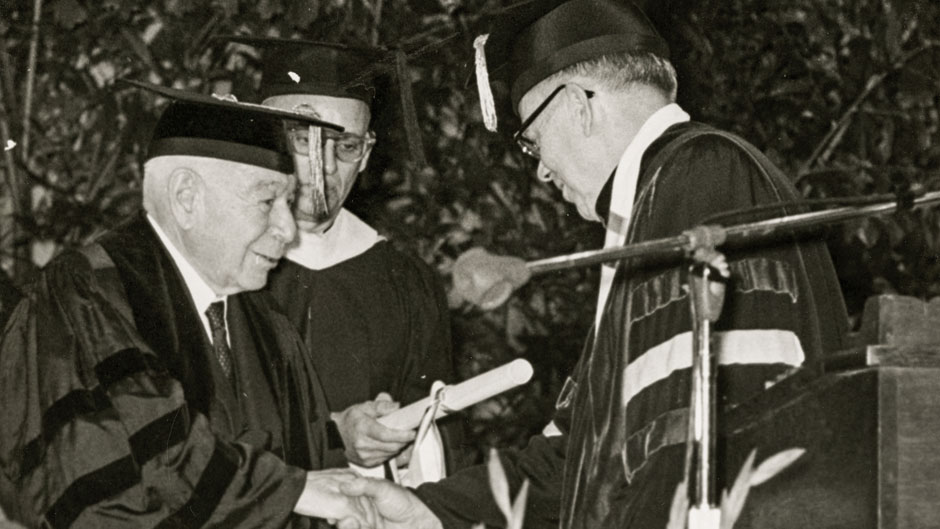Robert Frost spent the last winters of his life writing from Pencil Pines, his cottage in South Miami, contemplating what uncertainty might teach us. In the opening line of one of his last poems, the celebrated American poet wrote: “If this uncertain age in which we dwell, were really as dark as sages tell… .”
Poets and poems walk us through times and terrain where we often hesitate—yet most ache—to go. When the world seems turned upside down and nothing makes sense, many turn to poetry for an anchor, a staff to grasp to steady our feet. With sharp honesty, a good poem reminds us of our own frailty and humanity.
How does a poem do this? Why does poetry speak to us so keenly in challenging times?
“Poetry is such a concise art form, so there’s a way in which it can capture the sentiment, the sensation, the emotional potency of the moment, and the difficulty of the experience in a quick and easy way,” said Jaswinder Bolina, an associate professor in the University of Miami College of Arts and Sciences’ Creative Writing Department. “This compression allows the reader to approach, interact, and ingest so that you get this immediate experience of recognition in the poem.
“Especially in our distracted, highly anxious state, you can read poetry easily and quickly, and find a touch of humanity. That feels uplifting—and it can make you feel seen,” Bolina added.
April 1 marks the launch of National Poetry Month, a celebration of poetry organized by the Academy of American Poets that has taken place every April since 1996. Tens of millions of students, teachers, and poets participate around the country. While the department had scheduled a few associated events, the current COVID-19 situation caused cancellations.
Still, students are continuing to write and record their poems, and Bolina will be participating in the local “O, Miami Poetry Festival” activities. UM Libraries Special Collections houses the archives to this festival each year.
Mia Leonin, a senior lecturer, also in the Creative Writing Department, echoed the belief that poetry’s secret power to “distill profound emotion” lies in its compression. The author of several poetry collections, Leonin says that a poem doesn’t necessarily have to have a positive theme to make us feel uplifted.
Recently an elderly friend not able to leave her home asked Leonin to send her a poem of hope.
“What poem do I send?” she remarked. “I don’t necessarily go to poetry for hope, but I go to experience feelings and emotions deeply—and, maybe in the end, that does bring some sort of hope.”
In this time of “emotional quarantine,” Leonin recognizes that she and many of her students are struggling with feeling distracted. Poetry, she suggests, offers an antidote.
“Anxiety is often caused by pushing away emotions. It’s a by-product, an emotional static when we aren’t tuning into our real emotions,” Leonin said. “Right now, just getting through the day and obtaining some sense of normalcy can be very anxiety producing, but a poem—even if it’s not about hope—that pause and depth of feeling a poem brings anchors me. In times of crisis, that’s what I go to poetry for.”
Kelly Miller, the associate dean for learning and research services for University of Miami Libraries, wrote her dissertation on ekphrasis poems and the poetry of Anna Akhmatova, a renowned Russian poet. Students from the Creative Writing program visit the library’s special collections to examine a painting or visual and then describe it in words. The creative exercise serves to deepen the memory connection, according to Miller.
Miller was entranced by poetry as an undergraduate student when she heard several renowned Russian poets—Bella Akhmadulina and Yevgeny Yevtushenko—read their poetry on visits to the United States. The poets were known as “stadium poets” in the 1960s because they recited their poems by heart to stadiums full of listeners.
“I was mesmerized and curious how poetry could be so powerful,” she recalled. The experience prompted her to go to graduate school in Slavic Languages and Literatures and visit St. Petersburg, Russia, where she lived for a year on a Fulbright to conduct research on Russian poetry and art. “In Russia, poets are perceived as truth-tellers who have an ability to transcend the mundane experience of human life.”
Miller appreciates the ability of both poetry and painting to slow things down.
“I enjoy the chance to be present with words and images in this compressed, concise way. It helps us see something from a new perspective and to better understand our lives as human beings,” Miller said.
“It strikes me that poetry,” she added, “is written from one human being to another—a conversation. People often come to poems at times of heartbreak, and this is a time of collective heartbreak, so what better time for poetry?”
The University of Miami Libraries provide online access to thousands of poetry resources, including e-books, biographies, and scholarship about poetry.

